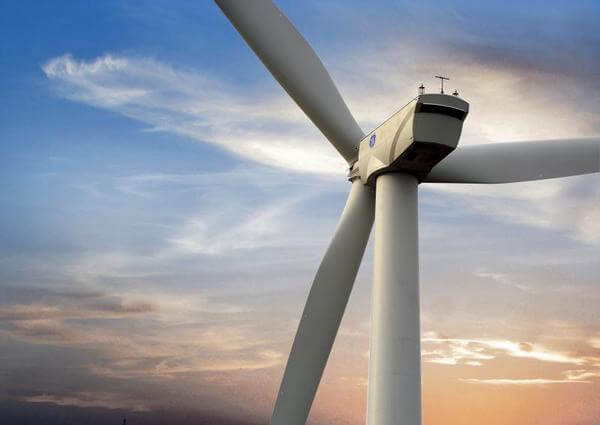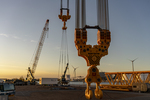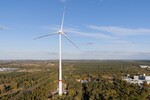News Release from windfair.net
Wind Industry Profile of
Who turned the clock back?
Trump wants to keep his pre-election promises
In the US, the carbon-friendly climate is being heated by - who else - President Donald Trump. Already in the election campaign, the declared friend of coal and climate change denier came out with the promise to ensure that all miners in the US will return to employment. Of course not in different branches, but actually in the coalmines of the country. Since Trump is in power, systematic efforts are being made to discredit renewable energies and initiate a renaissance of coal. However, this campaign is unlikely to be successful, as most companies have long since turned their back on coal. Fracking has led to falling natural gas prices in the US, so that in recent years many coal-fired power stations have been replaced by the more environmentally-friendly gas power plants. In addition, there has been a huge decline in prices for renewable energies and there is no end foreseeable to this developement.
 Nevertheless, the Trump government is trying to influence public opinion again and again: The White House, at the beginning of this week, has halted an investigation into the potential health risks facing the population close to coal mining overground. The official statement reads: For the study, which was commissioned by predecessor Barack Obama, no further tax money is to be wasted, according to the institute responsible for the study, The National Academies of Science, Engineering, and Medicine.
Nevertheless, the Trump government is trying to influence public opinion again and again: The White House, at the beginning of this week, has halted an investigation into the potential health risks facing the population close to coal mining overground. The official statement reads: For the study, which was commissioned by predecessor Barack Obama, no further tax money is to be wasted, according to the institute responsible for the study, The National Academies of Science, Engineering, and Medicine.
Energy utility against the government
In Australia, the country's largest energy supplier, AGL, has also come to terms with the incumbent government of Prime Minister Malcolm Turnbull. AGL states future investments in coal-fired power plants are an economic nonsense and has therefore been investing more and more in renewable energies for the last years. It was only last week that the company announced the construction of the largest wind farm in Australia. Coopers Gap wind farm in Queensland is to have a capacity of more than 450 MW and is already the second major wind energy project this year. “AGL’s commitment to a lower emissions future is clear. The company announced earlier this year it would ramp up investment in renewable energy and decarbonise its generation by 2050. This wind farm represents a significant step towards that goal and we are proud to be a part of that,” said Geoff Culbert of GE, project partner of AGL.
This announcement may have led to displeasure in the government, because Prime Minister Turnbull is said to be close to the coal industry. Australia's energy supply was based on coal in the last decades, and measures for the transition of the energy supply were only made very late. In addition, there are frequent changes of government – in the past decade alone, the country has had five different prime ministers – making a long-term energy policy impossible.

US turbine manufacturer GE is one project partner for the construction of the AGL wind farm (Image: GE)
No more money for coal
AGL CEO, Andy Vesey, however, stresses the need to abandon coal: “The strong support we have received from our equity partners and lenders for these projects is testament to the readiness of the private sector to invest in Australia’s energy transformation. Certainty on energy policy, including the implementation of the recommendations of the Finkel Review, will enable more projects of this kind to go ahead and help place downward pressure on energy prices by increasing supply,” he said. The Finkel review examines how a future Australian energy supply can look like.
On top of that, AGL has announced that it will not extend the operation of one of its few remaining coal-fired power plants, Liddell, beyond the year 2022 and wants to build solar and wind power plants instead. “We just don’t see the development of a new coal-fired power station as economically rational, even before carbon costs,” Vesey told Newcastle Herald. This only came days after the politically charged confession of Tomago Aluminum, one of the biggest energy consumers of the region, who admitted to lobbying with politicians to build a new coal plant to replace Liddell.
AGL explains their planned coal exit in this video (Source: AGL)
Election campaign influenced by lobbyism
In Germany as well, lobbyists are currently experiencing a boom, because of the upcoming election of a new government next month. The most important thing to come under fire is the energy transition with its allegedly high costs. For example, the four remaining federal states of Germany which are still digging coal recently sent a letter to the German Federal Ministry of Economics, which calls for the use of higher pollutant limits of mercury and nitric oxide in the EU. The reason for this letter is a simple one: German coal plants are not clean enough, as German media outlets like Tagesschau reported.
Environmental politician and President of the Energy Watch Group Hans-Josef Fell pointed out that in recent weeks reports have accumulated in large German media outlets that "... turn renewable energies into a bad light as a price booster and a problem for the German economy." Fell considers this a defamation campaign, among other things launched by the controversial initiative Neue soziale Marktwirtschaft (INSM, "New Social Market Economy"), a think tank founded by several employers’ associations. In the past, the INSM had repeatedly been the center of various controversies, including editorial influence.
The fight for freedom of opinion in the German media is currently in full swing, but not only the opponents of the energy transition have their say. The Solar Energy Association SFV, for example, is making the effort to underline some of the opponents' theses with facts in a detailed article to be read here (in German).
Clocks are indeed ticking differently, but there is no way to turn them back.
- Author:
- Katrin Radtke
- Email:
- press@windfair.net
- Keywords:
- wind energy, coal, USA, Australia, AGL, GE, Germany








